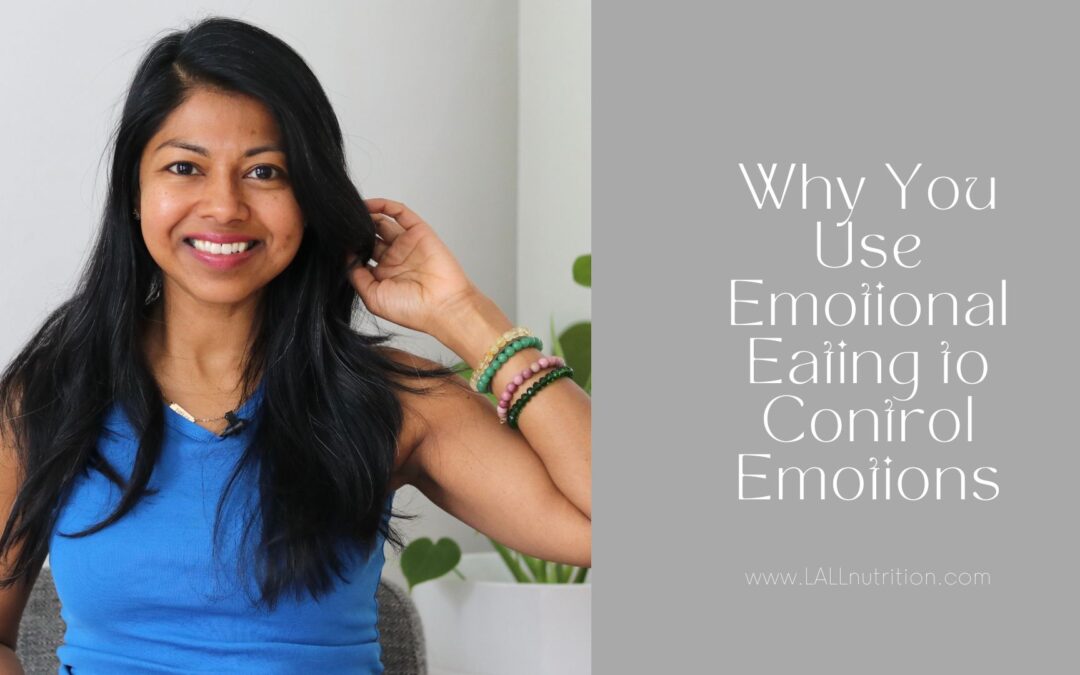Hello love,
It’s important that we understand what we’re using our emotional eating for. Most women speak to see how they get stressed or they have discomfort, they emotionally eat. But I don’t think they quite understand that they are using their emotional eating to control their emotions.
Food is soothing them.
It’s giving them a disconnect from the emotions temporarily. It’s a control mechanism.
Emotional eating is when we use food to soothe ourselves from any discomfort, uncomfortable emotions, or any stress that comes up in our life. What I’ve seen with this pattern in clients is that it originates in childhood because we didn’t know how to be with our emotions. We weren’t modelled this. We didn’t have parents or caregivers that could help us regulate our nervous system and move through this discomfort.
So we had to “deal” with it in our own way.
Eventually, emotional eating is the pattern that emerges. It’s not that you’re sitting around at five years old eating bags of chips, although that could be the case for some people. It’s a pattern that develops over time. This is the way we control our emotions. We don’t want to feel that discomfort.
Why would we want to control our emotions?
Because we don’t feel accepted for them and we don’t accept our emotions. We don’t know how to accept them. We were modelled that something was wrong with us if we had these big emotions.
We start to believe something’s wrong with us for having emotions. If we look around at our society, we’re told we need to be composed. We need to not make any waves. To not have or express big emotions.
And while we want to be in a calm state because that means our nervous system is in a calm state, we want to do this through processing emotions not controlling them.
By controlling emotions we put ourselves into a fight or flight mode because we’re holding in those emotions and not allowing them to be. So our nervous system is activated and agitated, and it gets triggered more easily.
Using food to soothe?
When we’re using our food to control our emotions, we’re continuing that rejection of our emotions. We control them and in a way we’re rejecting a part of ourselves.
Emotions are information.
If something happens to us and we feel sad, there’s information in that. If something happens and we feel isolated and rejected, there’s information in that. We needed to have parents or caregivers help us move through those emotions, to accept them, to tell us they were okay and to help us move through the physical sensations of the emotions and the messages in the emotions and to help us make sense of our world.
Most of us did not receive that. Our society tells us we should be more put together and calm.
But we’re actually doing the opposite when we say that to ourselves. Our emotions, when they’re not allowed to move through us, remain unresolved.
So if you’re left feeling with an unresolved emotion that is stored in your body as a trauma. We then control it whenever that gets triggered. Food is the way we control it because when we eat food to soothe ourselves, we numb that feeling. We push it down and suppress it.
More out of control
As emotional eaters start feeling out of control with food and our body because the thing that we’re using to control our emotions is now an issue. We’ve now created this pattern where we are trying to control our emotions, food and our body. The more we try to control and stuff and restrict around food and our body and our emotions, the bigger and bigger this gets, the more out of control we feel.
We need to turn towards ourselves. We need to start understanding ourselves rather than control. To understand and to really see where this pattern comes from.
Rejection
This pattern usually develops in childhood. Why would we want to control our emotions? Well, they were most likely rejected by our environment, by our society, by our parents or caregivers.
When I was young, I remember being told over and over again that I was really sensitive and that I cried very easily. And so I thought something was wrong with me. So I held in all of my emotions and I had this shield, I was really serious. And you can see that in kids when they’re holding something in, they’re very tight in their body and they’re not being themselves. They have this mask on, they have this shield on and it’s how they think they can protect themselves.
Rejection means that they’re not going to survive.
Now we have this shield of I don’t feel anything, but I really do. When it gets triggered, we go towards food to numb out and feel okay.
Emotions are important
What I want to shift for you is that emotions are important. The more we can accept our emotions and move through them, the less out of control we’re going to feel with them. But we need to do this in a specific way.
We need to start creating safety and understanding around our emotions to allow them to be, to not judge them. If we have these deeper wounds and these deeper limiting beliefs around our emotions we need a powerful way to move past them. This is why I love the somatic meditations that I use with clients inside of the Emotional Eating Evolution program to really get into the body because that’s where we’re holding on to these unresolved emotions.
We somatically work with them and that’s how we shift our perspective of them. We get to the root. This is one layer that helps to resolve emotional eating along with true nourishment and body acceptance.
Invitation
If you’d like to resolve your emotional eating from the root, and stop using control and willpower then I invite you to apply and book in an Emotional Eating Clarity call HERE. On the call we find out more about you, what you’ve tried, your goals and how we can support you inside of The Emotional Eating Evolution Program. The Emotional Eating Evolution Program has a high level of support, accountability, and a step by step methodology to help you resolve your emotional eating from the root so you can finally feel at ease, free and confident around food + in your body.
To resolution,
Michelle
Certified Holistic Nutritionist specializing in Emotional Eating


